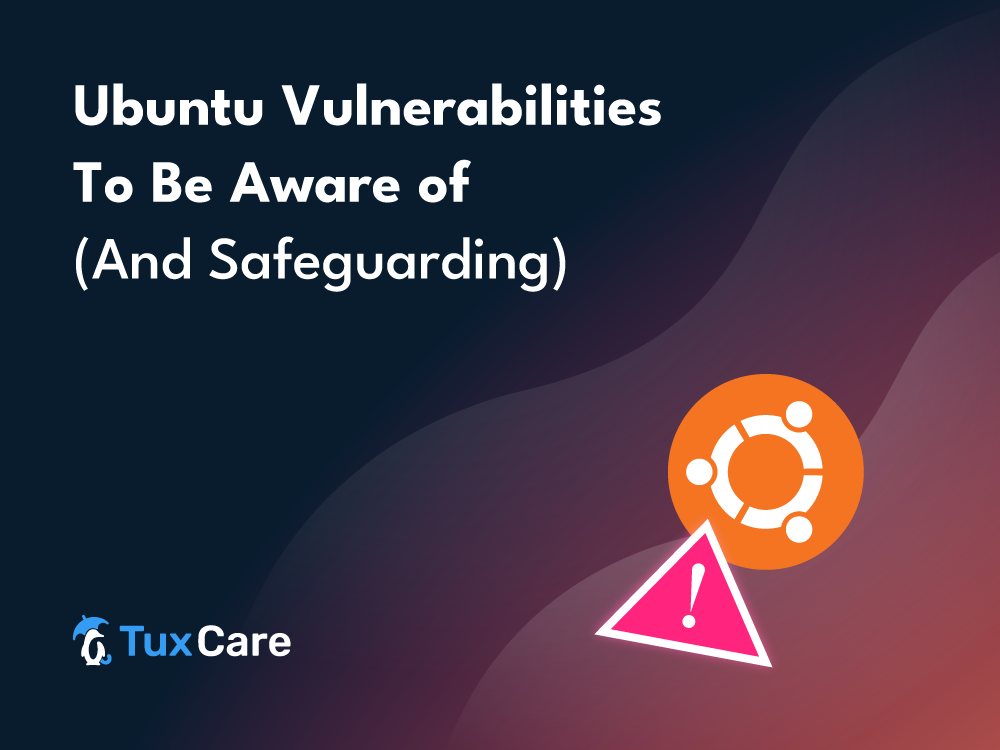Key Takeaways
- Ubuntu vulnerabilities can lead to privilege escalation, remote code execution, and full system compromise if left unpatched.
- Attackers target kernel flaws, outdated packages, and weak configurations, making regular security updates and system hardening essential.
- TuxCare’s KernelCare Enterprise provides automated, rebootless patching, ensuring continuous protection against kernel exploits without downtime.
Is your Ubuntu system truly secure? Hidden vulnerabilities can expose it to data breaches, privilege escalation, and unauthorized access. Ignoring these risks leaves the door open for attackers. This article covers how to detect Ubuntu vulnerabilities, understand their impact, and take actionable steps to secure your system.
A List of Ubuntu Vulnerabilities
Ubuntu, like any operating system, is vulnerable to security flaws that can compromise system integrity, expose sensitive data, or allow unauthorized access. Attackers actively exploit these weaknesses, making it essential to stay informed and patch systems promptly.
Below are some notable vulnerabilities affecting Ubuntu systems, along with their impact and severity:
CVE-2024-36971
A race condition in the Linux kernel’s ATM subsystem (net/atm/ioctl.c) causes a use-after-free vulnerability. This flaw, found in the vcc_recvmsg function, could allow a local attacker to trigger a system crash (denial of service) or potentially execute arbitrary code.
CVSS v3 Score: 7.0 High
CVE-2024-36971
A use-after-free vulnerability was discovered in the Linux kernel’s network route management, particularly in the __dst_negative_advice() function. The vulnerability occurs due to improper enforcement of RCU rules when clearing sk->dst_cache, leading to a potential use-after-free scenario.
This flaw could allow an attacker to alter network connection behavior by exploiting the improper order of operations in route management.
CVSS v3 Score: 7.8 High
CVE-2024-0565
An out-of-bounds memory read was found in the SMB Client sub-component of the Linux kernel (fs/smb/client/smb2ops.c). The vulnerability arises due to integer underflow during memcpy length calculation, leading to a potential denial of service (system crash) or exposure of sensitive information.
An attacker can exploit this flaw by sending malformed server command fields, triggering an out-of-bounds read.
CVSS v3 Score: 7.4 High
Less Vulnerability (CVE-2024-32487)
This vulnerability was discovered in the less package, a pager program which helps to display content of the text file in the terminal. It was found that less allowed OS command execution via a newline character within a file name due to mishandling of quotes in the filename.c component. This vulnerability allows attackers to execute arbitrary code on your computer.
It can happen if attackers trick you into opening a specially crafted file. Additionally, exploiting this vulnerability usually involves employing file names under the attacker’s control, such as those extracted from untrusted archives and the presence of the LESSOPEN environment variable, which is commonly set by default in numerous scenarios.
CVSS v3 Score: 8.6 High
glibc Vulnerability (CVE-2024-2961)
In GNU C Library versions 2.39 and earlier, the iconv() function can potentially overflow the output buffer by up to 4 bytes when converting strings to the ISO-2022-CN-EXT character set. This overflow can lead to denial of service (application crashes) or overwrite neighboring variables.
CVSS v3 Score: 8.8 High
Why You Should Be Worried About Ubuntu Vulnerabilities
Ubuntu vulnerabilities because of Ubuntu EOL, or other reasons, pose serious risks if left unpatched. Attackers can exploit security flaws to execute remote code, escalate privileges, or even gain root access — allowing full control over a system. This can lead to data theft, malware infections, and persistent backdoors that compromise long-term security.
For enterprises, these risks extend beyond technical issues. A single exploited vulnerability can disrupt operations, expose sensitive customer data, and lead to regulatory non-compliance. Organizations subject to industry standards, like GDPR, HIPAA, or PCI DSS, face legal penalties and reputational damage if they fail to secure their systems.
Timely patching and vulnerability management are essential to prevent breaches and maintain system integrity. Security teams should regularly audit systems, apply patches, and use automated tools to detect and mitigate risks. By staying proactive, organizations can minimize their exposure to threats and maintain a secure IT environment.
How to Detect Ubuntu Vulnerabilities In Your System
Using OpenSCAP and Ubuntu OVAL
You can use OpenSCAP and Ubuntu OVAL data to scan for vulnerabilities in the Ubuntu system.
Step 1: Install OpenSCAP on Ubuntu
Run the following commands in the terminal to install the latest OpenSCAP version.
sudo apt update sudo apt install openscap-scanner openscap-utils
You can verify the installed version using the command below.
oscap -V
Step 2: Download the Ubuntu Oval Data File
Ubuntu OVAL files are machine-readable datasets listing known security vulnerabilities and their fixes for specific Ubuntu releases. They help determine whether a patch is applicable to your system.
Run this command to download the OVAL dataset file.
wget https://security-metadata.canonical.com/oval/com.ubuntu.$(lsb_release -cs).usn.oval.xml.bz2
Use the bunzip2 tool to unzip the file:
bunzip2 com.ubuntu.$(lsb_release -cs).usn.oval.xml.bz2
Step 3: Generate an HTML Vulnerability Report
Now, you can use OpenSCAP to evaluate the OVAL and create an html report.
oscap oval eval --report report.html com.ubuntu.$(lsb_release -cs).usn.oval.xml
Open the report.html file in your browser to view the report.
As you can see, it has detected that our Ubuntu system has not received the latest security fixes for Libxslt, Jinja2, Linux kernel, and other packages.
TuxCare Radar
TuxCare Radar makes it easy to spot vulnerabilities in your Ubuntu systems and prioritize them effectively. Its unique AI-assisted scoring engine looks at various factors, helping you assess the risk level of each vulnerability based on the real-world risk it poses. It works seamlessly with your TuxCare patching tools, making sure that deployed patches are automatically detected and accurately identified. You’ll get clear, reliable compliance reports with no false positives or negatives, so you can focus on the most critical issues.
How to Protect Your Systems Against Vulnerabilities
Detecting vulnerabilities is only half the battle – it is crucial to address them before attackers can exploit them. Here’s how you can safeguard your Ubuntu systems:
Keep Your Systems Updated
Canonical regularly provides security fixes for known vulnerabilities. By updating packages to the latest versions, you can stay secure from vulnerabilities.
For example, to patch the Libxslt vulnerabilities detected above, you can run these commands to update the package to the latest version.
sudo apt update sudo apt install --only-upgrade libxslt1.1
Then, you can generate a new HTML vulnerability report to verify whether the security updates have been applied.
Or, you can upgrade all packages to the latest available versions using the following command:
sudo apt upgrade
A system reboot is required to apply changes to the Linux kernel and other critical packages.
KernelCare Enterprise
Patching kernel vulnerabilities traditionally requires a system reboot, causing downtime. TuxCare’s KernelCare Enterprise solves this problem by applying live patches to the Linux kernel without needing to reboot or schedule maintenance windows. This allows you to fix critical security flaws immediately while keeping your servers running. KernelCare also automates patch deployment, ensuring security patches are applied as soon as they’re available — eliminating the risk of manual errors.
LibCare for Shared Libraries
LibCare, an add-on to KernelCare Enterprise, provides rebootless patching for critical shared libraries like glibc and OpenSSL. Typically, updates to these libraries require service restarts or reboots, but LibCare automates the patching process without any reboots.
Best Security Hardening Practices
Implement these key security hardening measures to minimize risks:
Strong Passwords: Enforce complex passwords and multi-factor authentication.
Minimal Services: Disable unnecessary services to reduce the attack surface.
Firewall Configuration: Use UFW or iptables to restrict network access.
Principle of Least Privilege: Grant only necessary permissions to users and applications.
Vulnerability Scanning: Use tools like TuxCare Radar to scan for vulnerabilities.
For a more detailed guide on hardening your Ubuntu systems, check out our comprehensive blog post on Linux System Hardening.
Stay Updated, Stay Secure with TuxCare
Protecting your Ubuntu systems requires constant vigilance. Regular updates and proactive hardening are essential. TuxCare’s KernelCare Enterprise ensures your systems stay protected against critical kernel vulnerabilities without disruptive reboots. By staying informed and using patching solutions like KernelCare Enterprise, you can maintain a secure and resilient Ubuntu environment, letting you focus on what matters most.
Send questions to our Linux security experts to learn more about KernelCare Enterprise and see how it can keep your Ubuntu systems protected with zero downtime.
Summary

Ubuntu Vulnerabilities To Be Aware of (And Safeguarding)
Description
Stay updated on Ubuntu vulnerabilities and learn how to safeguard your system with essential security patches and best practices.
Author
Rohan Timalsina
TuxCare
Publisher Logo

💸 Affordable Cloud Servers in Argentina! 🚀
At Full Tech Solutions, we offer Affordable Cloud Servers with high performance and advanced security, perfect for entrepreneurs, businesses, and developers looking for power at a budget-friendly price.
💰 Competitive Pricing: Power and flexibility without breaking the bank.
⚡ High Performance: Speed and stability for your applications.
🔒 Advanced Security: Protect your data with cutting-edge technology.
📞 24/7 Support: Our experts are ready to assist you anytime.
Don’t compromise quality for cost. Choose Full Tech Solutions and get the best affordable cloud servers in Argentina.
🌐 Scale your project with performance and savings!




